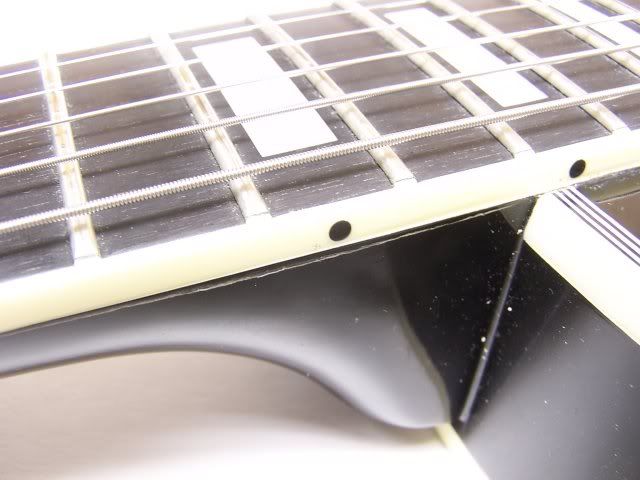• Talk with your fellow tone freaks on the web's liveliest (and friendliest!) tone forum. All are welcome, from seasoned pros to absolute beginners. If this is your first visit, be sure to check out the by clicking the link above. You may have to before you can post: click the register link above to proceed. To start viewing messages, select the forum that you want to visit from the selection below. Tech experts from Seymour Duncan are regularly on this forum, and are clearly labeled as employees of Seymour Duncan. They are here to help.

I recently got myself an used Gibson Les Paul Studio. I just found out it's got a scratch on one of the white inlay pieces (5th fret). Dec 10, 2014. I'm sure this has been posted 1000 times before, but I wonder if anyone else has dealt with this particular issue before. A few years ago, the neck on my Les Paul got slightly broken behind the headstock. By slightly, I mean that it didn't break all the way through to the front, but had a deep crack that would.
Is the lemon oil causeing the damage???See, what Don P is saying is that you should never use lemon oil on fretboard, because some people argue that it damages the wood. I strongly disagree with this fact, as I have been using lemon oil on certain guitars for over 10 years now, and it still works very, very well, and the wood is in perfect condition. The problem might be over-hydrating the wood though. I mean, I use oil on my fretboard twice a year, and I have pretty toxic hands. Treating it every 2 months seems like a lot. Like I said, I am no expert, but it does seem a bit excessive.
Hopefully some more knowledgeable forumite will chime in, and give you a better answer. Ebony is a really dry wood. Not at all naturally oily like rosewood is. It does need to be kept hydrated.what you use to do it is your choice. I think its one of those endless debate subjects.+1 on that.
I once cut a piece of ebony from a plank, sent it through the drum sander, put it on the neck, and then I noticed fine surface cracks. What happens, is that a plank of ebony will develop 'shakes' which are surface cracks. The ebony below the surface is usually fine, but it looks crap. It could quite possibly be that your board is from the outside of a plank. The shakes are unsightly at best, and will open up even more, eventually going all through the board.
Not good news, I know, but thats ebony for you. Its a brilliant fretboard timber, but it does need careful selection, initially, and then care with oil. I use lemon oil, its OK, its an oil. You could use light machine oil, almond oil, canola oil, Mr.Sheen, or good old fashioned Snake Oil. Just as a reminder though - oils do nothing to hydrate wood. What they do is help slow the transfer of moisture, but if you allow it to stay in dry conditions for too long, it doesn't matter what or how much of any oil or wax you put on a board, it will eventually dry out.
Still, in this case I think uOpt is probably right. A lot of guitars are just being built with poorly seasoned wood, and this happens. Fortunately it's not a big deal at all.
Fingerboard cracks can glued and filled with CA, scraped and polished, and you'll be fine. The only thing I have heard. That is the operative word. Not experienced.
With too much oil on the fretboard will cause frets to push out of the slots due to the expansion. As long as the oil is applied and then wiped off, there should be no problem. If the oil is allow to sit on the fret board, then the above issue could happen. Or so I have been informed. In my many years of guitar ownership, I have yet to have an acoustic or electric damaged due to humidity or dryness issues. I do have a 1964 Gibson Melody Maker that has typical finish cracks over its entire body.
I think that was just the finish and its age. I use turtle wax on my acoustic finishes. It works great and is even recommended now by Taylor. (Specific formulation, see Taylor website for what it is called, I cannot remember, not at home to go look at it) Brad.